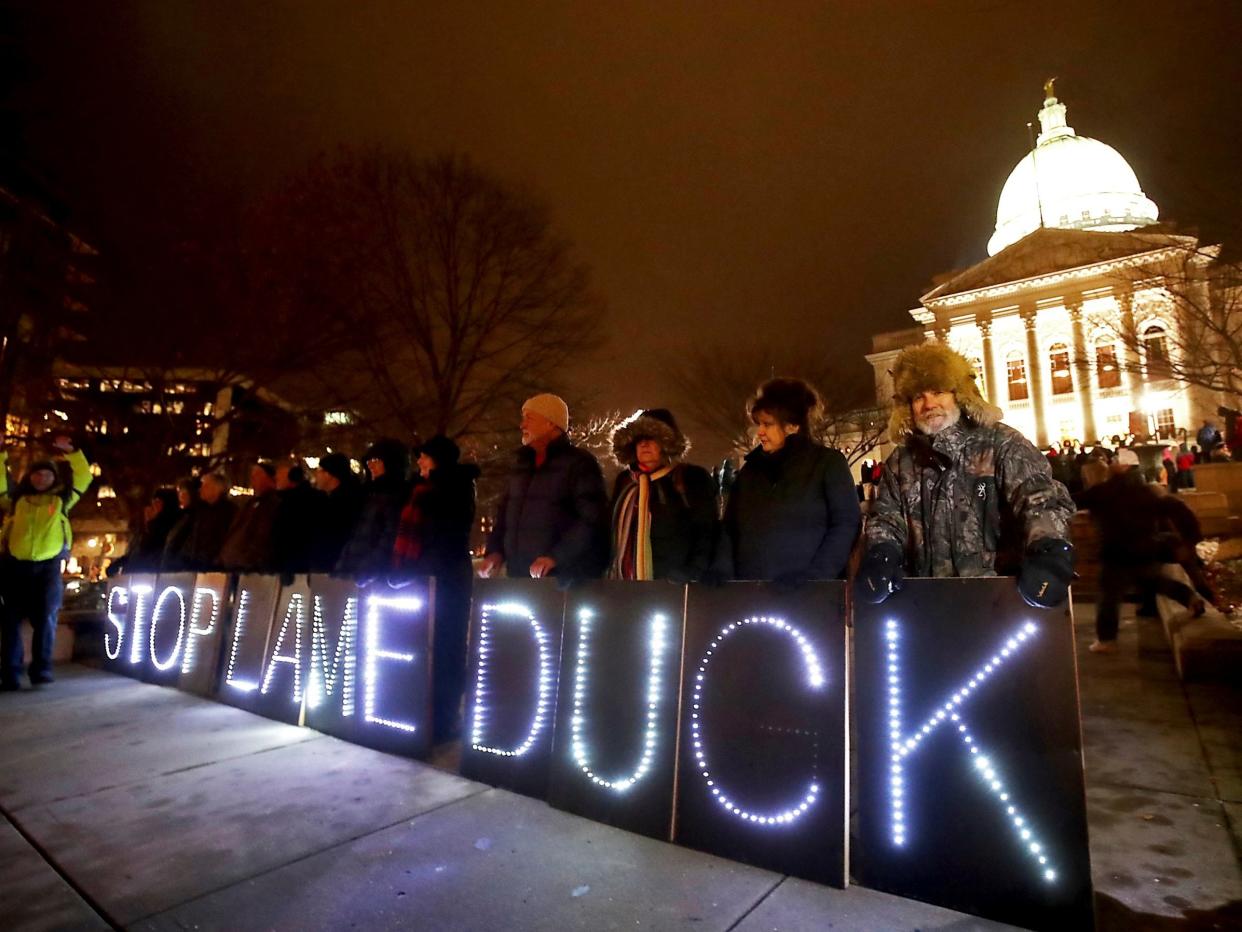Republicans rush to curb voter rights following trouncing in midterm elections - with major implications for 2020

After the midterm elections delivered sweeping Democrat victories in state and governor races across the country, Republicans have embarked on hasty efforts to undermine the will of the people and alter voting laws with important ramifications for the 2020 presidential election.
In at least four states, Republicans have undertaken an unprecedented lame duck effort to undermine the incoming Democratic leaders on a variety of fronts, including rushing to push through laws that would limit the ability of newly empowered democrats from overseeing state voter laws that appear to make it harder for Americans to vote.
This past week saw those labours beginning to bare fruit. Republican-held legislatures in Wisconsin, North Carolina, and Michigan all approved measures that would make it harder to vote and put in policy that will likely favour Republicans in future elections.
In Ohio, yet another attempt to undermine voters is still speeding through the legislature with the intent to be finished before power shifts.
“There is a distressing disrespect for democracy in some of these statehouses where there are clearly efforts, to varying degrees, to alter voting rights and the powers of certain state officers — either in defiance of, or not entirely consistent with, the will of the voters in November,” Max Feldman, counsel in the Democracy Program at the Brennan Centre for Justice, told The Independent.
All told, the 2018 midterm elections delivered more good news than bad for voting rights in the US, with seven states passing ballot initiatives that would make it easier for citizens to cast a ballot and harder for partisan legislatures to gerrymander their districts and entrench power.
But, voting rights activists are gearing up for a fight over the four states where Republicans are already rushing to curtail voting access. The states could prove crucial to President Donald Trump’s re-election campaign — with the president having carried all four in 2016.
“They’re having to take more and more drastic measures to maintain power by, they’re having to blatantly push further and further from acting as a representative democracy because the people they are representing have told them in no small numbers we don’t like what you’re doing”, Kat Calvin, the founder of Spread the Vote, an advocacy group that works to improve access to voting, said. “As you see more and more voting rights wins you’re going to see these people pulling in their power in any way they can, even thought they know what it looks like”.
In Wisconsin, state legislators have pushed laws that would restrict the incoming Democratic governor, Tony Evers, on a range of issues, pulling power away from the governor’s mansion and giving it to the legislature that will remain in Republican hands.
Included in those efforts are plans to limit the amount of early voting allowed in the state. That effort is similar to a previous law in the state that was found unconstitutional in 2016. A federal judge said the early voting cut “intentionally discriminates on the basis of race”. Once the restrictive law was overturned, African American voters in cities like Madison and Milwaukee helped to boost turnout to record rates in 2016 and in 2018.
The legislature in Madison has also sought make it harder for Mr Evers to change voter ID laws by expanding what types of IDs can't be used to vote. That voter ID law, which went into effect in 2016, has had a significant impact on voter turnout, with a University of Wisconsin-Madison study finding that the restriction kept as many as 23,000 people from voting in two of the state’s most Democratic districts during the last presidential election..
In North Carolina, the state legislature is working to ensure that its own voter ID law that had been previously been found to be unconstitutional because it targeted black voters “with almost surgical precision” — but was put up for a vote and passed this past election — will be rushed through in time for them to override Democratic Governor Roy Cooper’s veto before Republicans lose their super majority in the next legislative session.
In Michigan, Republicans are working to cut off voter registration 14 days before an election, which would effectively negate a voter-backed initiative from November that would have opened voter registration opportunities on election day itself. Finally, in Ohio, Republicans are working to pass a bill that would effectively make it all but impossible for voters to change the state constitution after a ballot initiative in November that attempted to eliminate partisan gerrymandering.
Predominantly lower class and minority Americans reported encountering a variety of issues when voting in the November midterm elections, with voter purges reported alongside broken voting machines, attempts to close polling locations in minority communities, and restrictive voter ID law requirements that critics say do little to fix a voter fraud problem that has widely been discredited as non-existent.
Those problems occurred in states that captured national attention for their implications for control of statehouses and even the US Senate — which Republicans retained control over — including Georgia and Florida, where Republicans won out in each case.
Voting rights workers say that voter suppression measures have only continued to stack up over the past year, and especially in the years since the Voting Rights Act was essentially gutted by the 2013 Shelby County v Holder decision by the Supreme Court. They do not expect the pressure to let up as American heads into a crucial election just two years away.
“The techniques of voter suppression, they may change, but what we’re seeing today is a constant, continuing push by elected officials whose powers are threatened by voter demographic shifts,” Sophia Lin Lakin, a staff attorney at the American Civil Liberties Union Voting Rights Project said.
She continued: “That’s really turning democracy on its head. Voters should be choosing their elected officials, not the other way around”.

 Yahoo News
Yahoo News 
